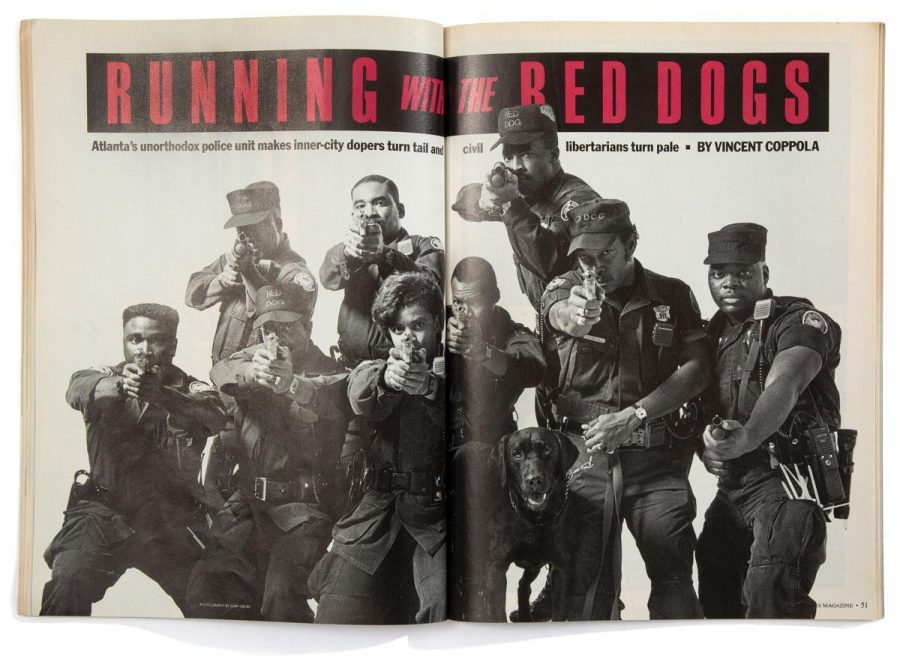The Red Dog Gang Unit Was Criminal
March 8, 2023
The Red Dog gang unit in Atlanta, Georgia had a history of police brutality, violating protocol, and oppressing people. Qualified immunity allowed officers to go unpunished, contributing to systemic issues of police brutality.
Special gang enforcement units in Atlanta, Georgia have been a topic of controversy for several years. One of these units, The Red Dog Gang unit has been accused of police brutality, violating protocol, and oppressing people. Despite nearly constant complaints and calls for reform, the Red Dog gang unit continued to operate with impunity, leaving many in the community feeling helpless and afraid. The Red Dog Unit Shrouded in a cloak of qualified immunity these officers went unpunished for their crimes.
Police brutality is rampant in the United States, and a special gang task force in the state of Georgia made headlines for a case of police brutality that resulted in the death of Jamarion Robinson in Atlanta in 2016. Jamarian was a 26-year-old Black man who was shot between 50 and 76 times by members of a task force unit with roots in the notorious Red Dog gang unit. The task force claimed Robinson pointed a gun at them causing them to fire numerous rounds. Witness accounts and evidence suggest that Robinson was unarmed and did not pose a threat to the officers.
The incident has been the subject of controversy and scrutiny. After the fact it was determined that Robinson was unarmed at the time and his family alleged that excessive force was used. The case has highlighted issues surrounding police brutality and the treatment of Black individuals in the criminal justice system. Despite ongoing protests and calls for accountability, the officers involved in Robinson’s death have not faced charges. The story of Jamarion Robinson serves as a tragic example of the ongoing struggles for justice and equity in the United States. The incident sparked protests and outrage, and the family of Jamarion Robinson filed a lawsuit against the City of Atlanta, alleging excessive use of force and wrongful death.
In addition to incidents of police brutality, the Red Dog gang unit has also been accused of violating protocol and committing unjust acts. In 2019, the Atlanta Journal-Constitution published an investigative report detailing the unit’s use of illegal search and seizure tactics, racial profiling, and false arrests. The report explained that the Red Dog gang unit frequently targeted young black men in low-income neighborhoods, often without probable cause or a warrant. Strip searches were happening outside, regularly. The unit also relied heavily on informants, many of who had criminal records and were paid or bribed to provide false information in exchange for reduced sentences.
The Red Dog gang unit’s actions have had a lasting impact on the people of Atlanta, particularly those in marginalized communities. Black and brown people in low-income neighborhoods are disproportionately affected by police brutality and systemic oppression, and the Red Dog gang unit’s tactics have only made these issues worse. The unit’s aggressive approach to policing has created a climate of fear and mistrust in many communities, making it difficult for people to feel safe and secure in their own homes. People used to recognize the vehicles of these often unmarked units and run away when they entered the neighborhood.
The Red Dog gang unit’s actions have also had an effect on free speech and political expression. In 2020, during the height of the Black Lives Matter protests, the special gang task force was accused of surveilling and intimidating activists and community organizers. Several organizers reported being followed, harassed, and threatened by members of the unit, leading many to fear for their safety and the safety of their families. This type of behavior clearly violates people’s First Amendment rights and undermines the principles of free speech.
Despite these allegations, the Red Dog gang unit has faced little accountability or consequences for its actions. The protection for this unit was largely shrouded in Qualified Immunity. The City of Atlanta has implemented some reforms, including the creation of a Citizen Review Board and the requirement that officers wear body cameras. However, many activists and community members argued that these reforms were not enough and that the Red Dog gang unit should be disbanded. In 2011 the original Red Dog unit was disbanded. It was immediately followed by the forming of a new unit; the “Apex Unit” essentially performing similar actions in a less violent manner. This unit was later disbanded and followed by the “Titan Unit in 2021. In many ways, it is the same unit clothed in a different name.
Ironically one of the leaders of the red dog unit was Chief C.J Davis. She ran the unit from 2006 – 2007 during her time with the Atlanta Police Department. Davis the current chief of the Memphis Police Department recently made headlines after the brutal police killing of Tyre Nichols. Is this a pattern of leadership, or a culture that is propagated in police departments throughout the USA?
The Red Dog gang unit’s actions were criminal and just one example of the power of policing in our country gone wrong. Special teams in law enforcement are not supposed to be exempt from the rules and orders for enforcing the law. If these units can not operate under reasonable and just standards, much less follow protocol, they should not exist. The unit’s tactics left a lasting imprint on the community, creating a climate of animosity and fear toward the police. While some minor reforms have been implemented, many argue that more needs to be done to ensure that police officers are held accountable for their actions. End qualified immunity. No more gangs in policing.







